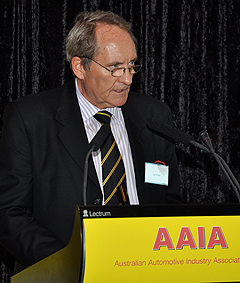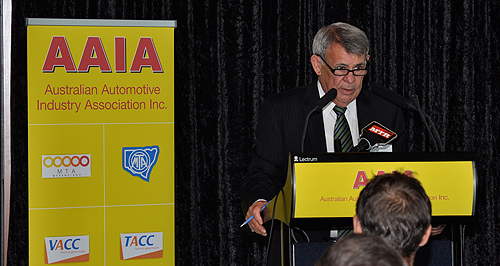Make / Model Search
News - General NewsDefections gut motor trades bodyNew group: The chiefs of motor trades groups in four states - David Purchase (VACC, left), Malcolm Little (TACC), Ian Field (MTAQ) and James McCall (MTA NSW) announce the new motor trades industry organisation in Melbourne yesterday. Four states set up new peak automotive organisation – but SA and WA refuse to jump6 May 2010 FOUR state automotive industry associations that tore up their membership of the federal Motor Trades Association of Australia (MTAA) have set up a rival organisation to look after the interests of car dealers, car repairers and others in the retail motor trade at a national level. However, their hopes that sister organisations in other states and territories would quickly fold their tents and join their new organisation, the Australian Automotive Industry Association (AAIA), were dashed yesterday when the two main hold-outs, West Australia and South Australia, both said they had no intention of breaking away from the MTAA. The Motor Trade Associations of WA and SA both expressed confidence in the MTAA, with MTA SA chief executive John Chapman saying the federal body had a “superb record” in looking after the interests of the industry. And MTA WA CEO Stephen Moir told GoAuto that the member states should work together to fix the problems with the existing organisation rather than establish a new one. “At this stage we won’t be jumping across,” he said. “Western Australia has a long association with the MTAA, and whilst we acknowledge there are issues to be addressed, they are none that are insurmountable.” The three biggest state organisations – MTA News South Wales, MTA Queensland and the Victorian Automobile Chamber of Commerce (VACC) – were joined by the Tasmanian Automobile Chamber of Commerce (TACC) at a media conference in Melbourne yesterday to announce the new organisation, which they said was born out of frustration with the management and effectiveness of the MTAA over the handling of a number of key issues effecting members.  Left: MTAQ executive director Ian Field. Left: MTAQ executive director Ian Field.MTA NSW chief executive and acting chief executive of the new AAIA, James McCall, said the MTAA had taken on a life of its own, and despite efforts by the member bodies to reform it, was still cumbersome and ineffective. “Four states stayed inside the federation longer than we should have,” he said. “But we did because we believed we could reform the organisation from within. “We have now realised that the organisation is so tightly controlled by one person that reform is impossible. “And it is with a considerable degree of sadness that we have walked away and seen the only way forward by forming a new national association.” Mr McCall said the AAIA would represent 80 per cent of auto industry small businesses employing some 100,000 people. Mr McCall was supported in yesterday’s presentation by VACC executive director David Purchase, MTAQ executive director Ian Field and TACC general manager Malcolm Little. For the MTAA, which is managed by founding CEO Michael Delaney, the disintegration began when the MTAQ left the organisation in 2005, and was followed two years ago by the VACC and then the Tasmanian chamber. Last December, the biggest branch, the MTA NSW, joined the exodus. Apart from the running of the MTAA, also at question were the operations of the industry’s super fund, MTAA Super, which was administered by the MTAA from its office in Canberra. The member groups at yesterday’s media conference were at pains to point out that they had no beef with the super fund, and continued to be supportive of it, but they clearly were not happy with the arrangement that had Mr Delaney overseeing both the MTAA and the fund, which has tumbled from one of the top-earning industry funds in the country to one of the lowest. Mr McCall said the chairman of MTAA Super’s trustee company, Dr Allan Hawke, had told members in a letter that the administration role of the MTAA had been severed and that administration would be handled by the trustee company. The move, along with resignation of four of the eight member state and territory organisations, is expected to strangle MTAA finances. “The majority of his (Mr Delaney’s) fees are gone,” Mr McCall said. The MTAA could also find itself without premises in Canberra, as the associations that have resigned own a large slice of the $20 million building and are set to wield that influence over the new few months. The AAIA has already hired a consultant to head-hunt a CEO for the new body, but they have agreed to tender out lobbying tasks to a specialist company, rather than hire a lobbyist in house. At time of publication, GoAuto was still waiting to hear from Mr Delaney, but a statement on the MTAA’s web site said that for more than 20 years, the MTAA had been recognised as being the voice of the retail motor trades, with a long and proud record. “MTAA’s focus has never wavered, nor has its purpose, intent and passion in representing all retail motor traders and, in so doing, working for the protection of their interests,” the statement said. “And so, MTAA continues – and will continue – to be the pre-eminent voice of all retail motor traders by virtue of the quality, standing and integrity of its members, the skills it possesses and the manner of the regard in which it is held by those who seek its counsel.” The statement said the MTAA would also remain employer sponsor of the MTAA Super Fund, “one of the largest industry funds with over $5.5 billion in funds under management and with over 290,000 members”. VACC’s Mr Purchase said that in setting up the new AAIA, the member bodies were committed to a more transparent, more proactive and streamlined organisation to better represent the industry at a national level. Describing the organisational switch in automotive terms as a “model change”, Mr Purchase said the industry was facing severe problems and needed a thoroughly professional organisation to protect its interests in Canberra. He said he hoped and expected that the other states and territories – WA, SA, Northern Territory and Australian Capital Territory – would join the new organisation. “They will be made most welcome,” he said. But MTA WA’s Stephen Moir said that until his board decided otherwise, his organisation would be sticking with the MTAA. “It would take a compelling reason for us to shift,” he said. “I don’t think just changing the name does a lot. “Yes, there are issues that need to be rectified and we need to move forward.” His stance was echoed by SA’s John Chapaman, who said: “Like all organisations, the MTAA needs some changes. “We need to fix it and move on,” he said. Mr Chapman dismissed a suggestion that the defections of four state organisations to the AAIA would render the MTAA toothless, saying it would continue to do battle for its members.  |
Click to shareGeneral News articlesResearch General News Motor industry news |









Facebook Twitter Instagram